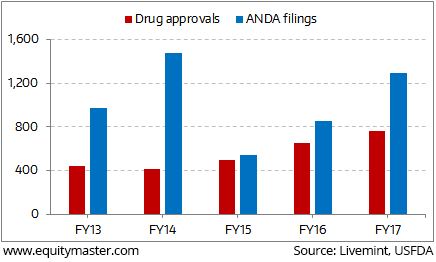Sensex Trades Dull; Bank Stocks Lead Losses
After opening the day in the red, share markets in India have continued the downturn and are presently trading below the dotted line. Sectoral indices are trading mixed with stocks in the banking sector and stocks in the power sector trading in the red. While stocks in the metal sector are trading in green.
The BSE Sensex is down by 135 points (down 0.4%) and the NSE Nifty is trading down by 53 points (down 0.5%). Meanwhile, the BSE Mid Cap index is trading down by 0.5%, while the BSE Small Cap index is trading down by 0.1%. The rupee is trading at 64.49 to the US$.
In news from stocks in the pharma sector. Dr Reddy's share price is among the most active stocks today as the company received an establishment inspection report (EIR) from the US Food and Drug Administration (USFDA).
The company received the establishment inspection report (EIR) for its for its formulations manufacturing plant-3 in Hyderabad.
As per USFDA, after the completion of an inspection of a facility, an EIR is issued to a company detailing inspection findings.
On April 28, 2017, Dr Reddy's Laboratories (DRL) was issued form 483 with 11 observations at its plant-3 at Bachupally, Hyderabad relating to deviations from good manufacturing practices. The company had then clarified that most of these observations were procedural in nature. These observations reflected the need to improve people capabilities and strengthen documentation and laboratory systems.
At the time of writing, Dr Reddy's share price was trading up by 3.5%.
Indian pharma companies catering to the US markets are breathing a sigh of relief. After being adversely affected by import bans and the suspension of new drug approvals from manufacturing facilities in the past three years, there has been a sharp pick-up in new drug approvals in FY17. With an aim to lower the overall healthcare costs in the country, the US Food and Drug Administration (FDA) approved a record 763 generic drugs for the financial year ending 30th September. As per Mint Analysis, Indian pharma companies received 295 approvals accounting for 40% of the overall approvals during the year.
Generic Drug Approvals Hit the Roof

Even the total filings of abbreviated new drug applications (ANDAs) for generic drugs rose to 1,292 in FY17 from 852 in the previous year. While, faster approvals expedite the commercialisation of product pipelines of domestic pharma companies spurring growth. At the same time however, it has raised the intensity of competition resulting in pricing pressures. The price erosion has been further compounded by a consolidation among US distributors and the decline in the number of products going off-patent over the past few years.
In other words, acceleration in generic drug approvals is like a double-edged sword. The growth boost can be quickly offset by the ensuing pricing pressures. Pharma companies that invest in creating a pipeline of complex generics or building competencies in alternative dosage forms are better equipped to tackle the changing dynamics in the US generics market.
Moving on to news from stocks in the banking sector. Punjab National Bank (PNB) share price is in focus today after the bank initiated proceedings to raise over Rs 50 billion.
The bank aims to raise the amount via qualified institutional placements (QIP).
The board of the bank had already given approval a few weeks ago to mobilisation of Rs 50 billio through various instruments, including rights issue and private placement, during 2017-18.
The bank has approved the floor price of Rs 176.35 per share of face value Rs 2. This fundraising is seen as a positive for the bank as it would aid it in improve its capital adequacy ratio, which in turn would partly fund its future loan growth besides help it to provide for its bad loans.
To make the most of the market optimism, an increasing number of companies are opting to raise funds through the primary markets with the help of tools like QIPs.
QIPs are set to touch a record high in 2017. Since the beginning of 2017, QIPs have crossed Rs 340 billion. According to Prime Database, more than 60% of this amount has been raised by companies belonging to the BFSI (banking, financial services, and insurance) space. This includes the likes of State Bank of India and Kotak Mahindra Bank, which have raised Rs 150 billion and Rs 58 billion, respectively.
QIPs tend to be a faster way to raise capital as the dealing happens with a few investors - only institutions in this case. And this is why companies prefer this route - because of its convenience and fewer resource requirements compared to other methods of raising equity.
Buoyancy in the market and positive sentiment towards primary issuances are giving confidence to companies and investment bankers to push ahead with their capital-raising plans. With 17 offerings raising a little over Rs 340 billion in just seven months, fundraising through institutional placements will surpass the QIP record of Rs 346.7 billion set in 2009.
Disclaimer: Equitymaster Agora Research Private Limited (hereinafter referred as 'Equitymaster') is an independent equity research Company. Equitymaster is not an Investment Adviser. ...
more


